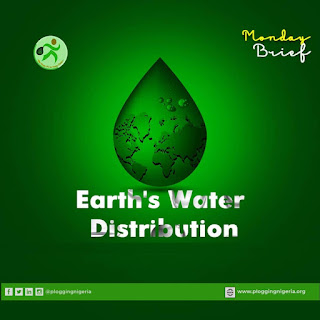It’s no news that the earth is a planet full of water, which is one of the reasons it is commonly referred to as the “Blue Planet.”
But out of the abundance of water on the earth’s surface, how much is really available and fit for daily use and consumption?
Water can be found in about 71% of the earth’s surface in total, that’s a lot, right!? Maybe not, as you will find out from the breakdown below, that there is no abundant water to waste.
How does the earth’s water make up 71%?
Well, about 96.5% of this water is found in the oceans, and only a relatively small portion of 2.5% is available as freshwater, which is fit for human, plant, and animal life.
This is because freshwater has a lesser salinity of 1%, unlike oceans which usually have a salinity level of 3.5%. That's why we don't drink ocean water. It's Salty.
The remaining portion of water on earth exists as vapour and is also found in rivers and lakes.
Considering this, it is safe to say almost all of earth’s water is saline since about 97% of it is found in oceans and lakes.
So, we have to make do with the 2.5% that is left. Doesn't sound like much water for 8 billion of us right?
The issue gets trickier because freshwater is unevenly distributed due to water pollution and climate issues induced by human activities. In the real objective sense, just 1% of freshwater is accessible and available to sustain human, plant, and animal living.
If the world has access to 1% of freshwater, and the human population is 8 billion, then each person has access to 0.000000000125% of fresh water.
It is important that we understand how water distribution works, for us to understand that Water is indeed a precious and limited resource. Only then will we learn to treat it as such.
Clean water is a luxury a large percentage of people in the world cannot afford right now and this is largely a resultant effect of human activities.
"Currently, 2.2 billion people have limited access to safe drinking water, and by 2025, half of the world’s population will be living in water-stressed areas."
There has never been a more critical time than now, to focus on preserving water because water is the core of our living, and its distribution keeps getting limited day by day due to our reckless activities.
Both individuals and sectors need to avoid waste and start taking sustainable measures to manage the limited amount of water that we have.
This week, reconsider your use of water. Sustainability starts with you!
—Adeola Olalere











.jpeg)






0 Comments